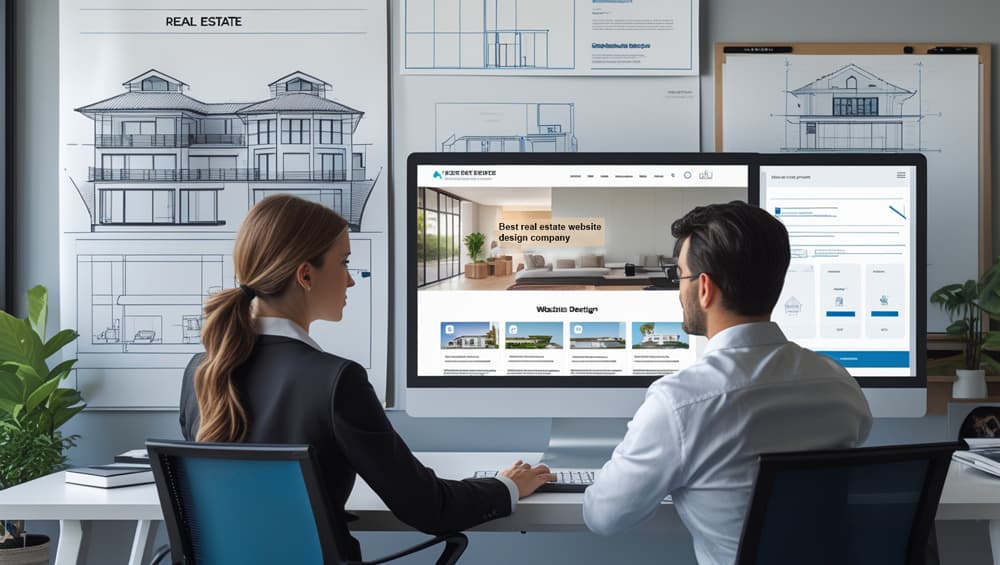How to Choose the Best Real Estate Website Design Company: A Comprehensive Guide

A real estate business today needs a powerful online profile just like a storefront needs a clear notice. Most customers and real estate agents start their home buying process online. A quality real estate website developed by experts helps realtors succeed or fail in their business. Deciding which real estate website design company to hire takes in-depth investigation and brand purpose recognition. This guide explains how to select an appropriate website design company in India for your real estate business using detailed decision steps.
1. Real Estate needs a professional website to succeed in the market
Before starting you should understand why an excellent website design firm matters.
Your website provides the initial meeting place that new clients experience with your brand before anything else.
When you use a skilled web designer for your project people develop faith in your work and understand your business stands firm in its commitments.
Websites perform effectively in turning website visitors into leads through properly designed forms and chatbot system together with clear call-to-action features.
Through one platform property listings gain better visibility to all customers.
An outstanding website enables you to be more visible against thousands of rivals.
Your website serves more than identification since it brings sales opportunities at its core.
2. Determine which exact needs and results you want to achieve
Set your objectives first because this step leads to web design company selection.
Type of Properties : Residential, commercial, luxury, rentals?
Website Features : MLS/IDX integration, property search filters, map integration, virtual tours, mortgage calculators, blog, CRM integration?
Our brand shows modern luxury standards with friendly business approaches while representing corporate values.
The website targets people entering real estate for the first time and also those who want to invest, sell, or rent property.
Mobile Responsiveness : Essential in today's mobile-driven world.
SEO Optimization : Ensure visibility in Google search results.
3. Look for Industry-Specific Experience
Real estate websites have unique requirements — general web designers might not be fully aware of them.
When doing your research, start with companies who :
Have experience developing real estate websites in the past.
Are aware of IDX/MLS integration.
Recognize the need for local SEO.
Are capable of managing high-volume listings without compromising speed.
Are aware of how to incorporate lead capture features.
Request case studies or portfolio samples specifically from the real estate industry.
Also Read: What is Web Design: A Comprehensive Guide
4. Examine Their Portfolio Carefully
The portfolio speaks best to the capabilities of a company.
While going through their work, keep an eye on:
Design Aesthetics : Is it aesthetically pleasing?
User Experience (UX) : Is navigation simple and intuitive?
Mobile Optimization : Are the sites optimized for use on smartphones?
Functionality : Are search filters, map views, and lead forms functioning as they should be?
Innovation : Do they use new-age features such as virtual tours, 3D views, or interactive maps?
A good portfolio indicates not only technical abilities, but also innovation and a responsiveness to industry demand.
5. Review Client Feedback and Testimonials
What current or past customers say about an agency is tremendously insightful.
Look for :
Google Reviews
Clutch, Upwork, and Trustpilot Reviews
Reviews on the Website
Check for :
Project turnaround times
The quality of communications
Support following a launch
Ability to troubleshoot
Warning sign : Cumulative criticism around a lack of good communication and poor meeting of deadlines.
6. Examine Their Workflow and Process
A good web design company in India will have a clear, organized process.
Ask them :
How do they collect requirements?
Will they build a prototype or wireframe first?
How many revisions are covered?
How do they handle project timelines?
Who will be your contact person?
Will there be frequent update meetings?
Firms with an open workflow reduce confusion, delays, and miscommunication.
7. Think about Customization and Scalability
A template-based, cookie-cutter site won't make you stand out.
You need a firm that :
Provides bespoke design solutions according to your brand identity.
Can develop sites that can grow with your business (with the addition of features such as CRM, payment options, more types of listings, etc.)
Works on adaptable CMS platforms such as WordPress, Drupal, or custom if required.
Customization guarantees that your website accurately represents your brand and is able to respond to your changing needs.
8. Talk About Technology and CMS Platforms
The backend technology is crucial for security, performance, and future maintenance.
Verify :
What CMS are they using (WordPress, Joomla, Custom CMS)?
Is updating listings yourself easy?
How secure is the site?
Will the site be optimized for speed?
Is the code clean and up to current standards (HTML5, CSS3, JavaScript)?
A technically sound site guarantees reliability, quick load times, and ease of upkeep.
9. SEO and Digital Marketing Capabilities
Creating a stunning website is pointless if no one can find it online.
Ask :
Will they do on-page SEO (meta titles, descriptions, URL structures)?
Do they provide technical SEO (sitemap, robots.txt, schema markup)?
Can they implement local SEO techniques (Google Maps, local listings)?
Will they install analytics and tracking?
Some agencies even provide regular SEO and digital marketing packages, which is a huge advantage if you need constant traffic growth.
10. Mobile Responsiveness and Speed Optimization
Mobile traffic accounts for a majority of web usage today, especially in real estate where people browse listings on the go.
Ensure :
Websites are mobile-first in design.
Pages load in under 3 seconds.
There's no compromise on user experience across devices.
Images and listings are well-optimized for mobile.
Google also ranks mobile-friendly websites higher in search results — making this non-negotiable.
11. Check Post-Launch Support and Maintenance Services
A website isn't a one-and-done project.
You'll need :
Regular updates (plugins, security patches).
Backup solutions.
Bug fixes.
Design tweaks or feature additions.
Select a company that provides low-cost maintenance plans or at least good documentation and initial support.
12. Ask About Pricing and Contracts
Get a clear picture of the costs involved.
Understand :
The project cost — fixed price or hourly rate?
What's included in the package?
Are there hidden costs (e.g., premium plugins, hosting fees, additional revisions)?
Payment terms — milestone-based or upfront?
Contract terms — timelines, deliverables, intellectual property rights.
Pro Tip : Never choose a company based purely on the lowest price — quality is crucial when it comes to real estate web design.
13. Communication and Project Management
Good communication is often the biggest difference between a smooth project and a frustrating one.
Check :
How responsive is the team during the initial inquiry?
How do they prefer communication (email, calls, project management tools)?
Who runs the project — one dedicated manager or several?
Do they employ project tracking tools such as Trello, Asana, Jira?
Good communication ensures your project remains on course, on time, and to your vision.
14. Local vs. Remote Companies: Advantages and Disadvantages
You may work with a local company or remote/international company.
Local companies : Smaller face-to-face meetings are easier to coordinate, superior familiarity with the local market.
Remote businesses : Generally less expensive, larger talent pool, 24/7 assistance can be an option.
Pay attention to the quality of the company's experience and communication rather than just location.
15. Red Flags to Be Aware of
Certain warning signs that you might want to avoid:
Unusually low pricing.
No defined timeline or project milestones.
Poor communication in initial conversations.
No real estate-specific examples.
Overpromising ("We will get you ranked #1 on Google within a week!").
No options for support after launch.
Hiring the wrong company will put your project behind by months — follow your gut.
Conclusion
Hiring the right real estate website design agency is more than just a service provider hire — it's finding a team that gets you, your vision, your market, and your goals. A well-powered, user-friendly, and strategically designed website can make your real estate business a leader in a highly competitive market. By taking the time to thoughtfully consider your choices, putting experience first, then functionality, and finally support, you can make a choice that not only suits your needs today but also sets your future up for success. Invest wisely — because in business, as in real estate, the foundation you lay today sets you up for success tomorrow.
Also Read: How Much Does an eCommerce Website Development Cost in India?
Recent Blogs

How to Choose a Domain Name for eCommerce Website

8 Factors that Will Impact Dynamic Website Design Cost
